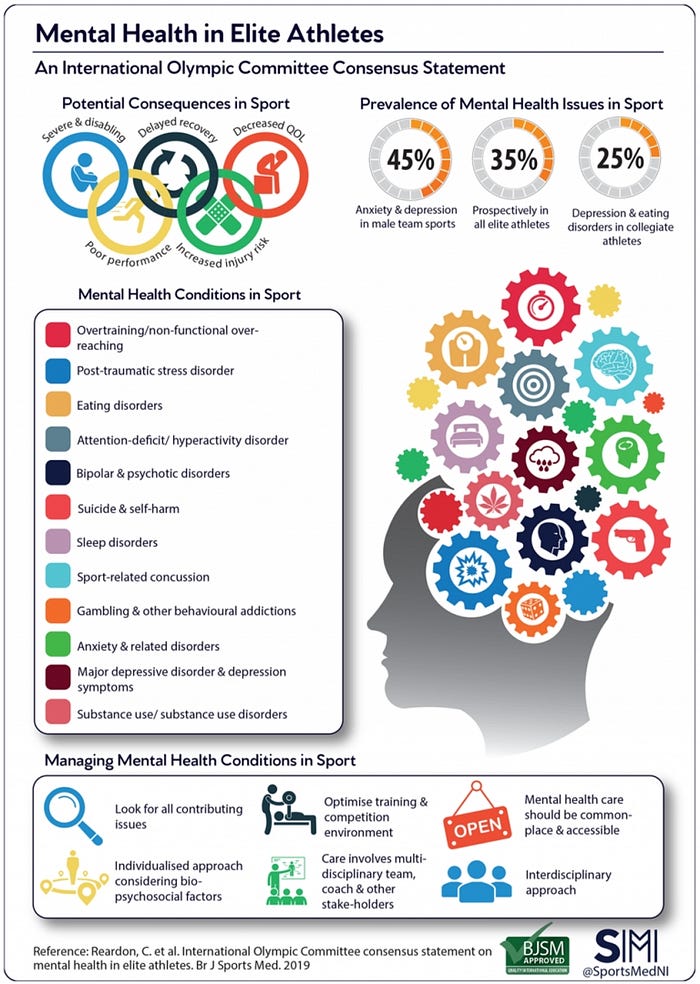Who are the Naomi Osakas and Michael Phelps of the business world? We are.
No one knows all the sacrifices that you make just to be good. Naomi Osaka[i]

[Michael’s] career came before his happiness. He dedicated every breath and heartbeat to accomplishing what he did. He sacrificed the self to be the greatest. Michael Phelps’ wife, Nicole Johnson Phelps[ii]
You have spent decades honing a skill at which you outperform your co-workers, and you got accolades and bonuses for your achievements. What if, even after being informed that you suffer from mental health challenges, your boss still demanded from you more responsibility and productivity, adding to your anxiety and depression? When asking for a better work-life balance or asking for a break you need, the company fines you for refusing to traumatize yourself further? What if you realized that you are a very different person when the spotlight does not shine?
Champions, and Human Sustainability Champions
On May 31, 2021, a day after being fined $15,000 by the French Open for missing a press conference, top-ranked professional tennis player Naomi Osaka announced that she would withdraw from the French Open, prioritizing her emotional well-being. Osaka — described in the trailer to an upcoming Netflix documentary as “one of the most gifted and complex athletes of a generation” — worked hard to make her Haitian father and Japanese mother proud.
She joined several other athletes, including Olympic swimmer Michael Phelps, in retiring from sports and addressing the impact of relentless pressure on their ability to cope with the stressors of daily life. In making herself vulnerable, Naomi Osaka joined other noteworthy athletes in pushing a once-taboo subject into the open.
Osaka faced backlash from the media for her choices; some people perceived her weak and selfish. British right-wing television personality Piers Morgan said that Osaka was “narcissistic” and accused her attitude of being “straight out of the Meghan & Harry playbook of wanting their press cake and eating it.”[iii] A sportswriter criticized her “diva behavior.”[iv] When Phelps had his second DUI (Driving Under Influence) arrest in the Fall of 2014, critics were also harsh.[v] The most decorated Olympian in history decided then to seek mental health help at a treatment and addiction center.
Their stories are also about the strains of high-performance workplaces, many of which make punitive demands and put pressure on employees — often at the cost of their mental health well-being. What can we learn from them?
Brutal Honesty: It is OK to not be OK.
I communicated that I wanted to skip press conferences at Roland Garros to exercise self-care and preservation of my mental health. I stand by that. Athletes are humans. - Naomi Osaka[vii]
Speak up: Osaka and Phelps opened up about their mental health issues. By speaking up publicly, they maintained control over their lives, advocating for their well-being and making career decisions that did not compromise their mental health, no matter the pressure that they were facing. Of course, such professionals have different tradeoffs to consider than most of us do, and have global platforms, and individual impact in combating emotional climate change matters. What role can each of us play in breaking the “cult of ambition” or redefining it?
Consider a change: It might be worthwhile to pause and reflect on the tradeoffs and sacrifices that you make for your job. Does your job add pressure and anxiety to your daily life? Do you feel “burnt out” or “bored out” when thinking about your tasks? Does your job provide you meaning and purpose, or, on the contrary, does it require you to sacrifice your mental health and emotional well-being?
Mind the Mind

Practice fierce self-care: Make mental wellness your top priority and take steps to protect it daily, even if your company doesn’t. What Osaka did wasn’t selfish — it was self-care. Only you know how best to protect yourself and nurture your emotional well-being. Some athletes, such as heavyweight boxing champion Wladimir Klitschko, show a path in proactive management of their total health. After a terrible loss, he recast his team, hired a mental health coach, and staged a historic comeback.[ix] Phelps invested in Talkspace (“Mental Health for All”), which he uses and advertises.
Move beyond shame: No need to shame yourself. You are not weak or selfish when taking care of yourself instead of accepting unhealthy work demands. Both Osaka and Phelps are quoted saying, “It is OK to not be OK.” Absurd job demands, pressure, and workplace competition may trigger emotional struggles. As Phelps and Osaka did, mind your mind.
Don’t be(come) your work. In a recent New York Times article, the writer shares great career advice — to think of jobs as verbs and not nouns. Working from home blurs personal and professional lines and makes it harder to give your brain some downtime. Tying our identity and life satisfaction to our success at work leaves us more vulnerable to its stresses and loss of identity. Osaka asks, “What am I if I am not a good tennis player?”[x]
Another contemporary risk mentioned in the Times article is the push to bring our “entire selves” or “authentic selves to work.” “If we’re encouraging people to bring their authentic self to work, we have to encourage people to leave the parts of themselves they’re not comfortable bringing without being penalized.” “Yes, I’ve done these great things in the pool, but I’m also a human,” said Phelps.[xi]
Dare to Care
The intention was never to inspire revolt, but rather to look critically at our workplace and ask if we can do better.
– Naomi Osaka[xii]

Set the example and broaden your impact: By prioritizing your self-care, you set the example, perhaps even set a precedent to help colleagues and friends. Champions like Osaka and Phelps are changing what sports managers can demand from athletes, putting sacrifices in context. The Michael Phelps Foundation is helping children develop healthier mental well-being habits, while destigmatizing mental health through corporate partnerships and advocacy programs.[xiii] And Klitschko and his team developed a methodology to help individual and corporate clients build resilience.
Support your colleagues: As you mind your mind, you can also help others manage their minds by doing simple check-ins, sharing your own experience, or providing mental health resources. As they perceive that they are not the only ones facing mental health issues at work, your co-workers will feel more empowered to follow your lead and claim basic mental health safety at work. Is anyone in your team strangely absent or always late? Does your manager stress out team members at each interaction? Reach out and ask how they are doing and feeling.
Enact change: While Osaka suggests that athletes must be allowed to sometimes skip media obligations without punishment, Phelps and other Olympians are calling on the International Olympic Committee and the U.S. Olympic & Paralympic Committee to do much more to address mental health issues in sports. If you are in a decision-making position, you may consider implementing measures tackling workplace well-being — measures that can be life-changing for many employees — and the organization as a whole. This could also include lobbying public sector leaders who have so far failed to address the mental health pandemic. In a recent Harvard Business School case study, Phelps asked:
How many other people are going to take their lives before we actually make a change? I’m sick and tired of it. I’ve dealt with it for my whole career and my whole life, and I basically am doing whatever I can to change the sports world for the good. I think there’s definitely a lot of change that needs to happen with the mental part of it, and we need to put some attention into that. It’s got to change from the top, and nothing is going on right now. I never saw a single thing in my 20-year career that they did to help us mentally.[xiv]
Phelps and his team were the driving force behind the one-hour 2020 HBO Sports documentary, The Weight of Gold, which describes the widespread mental health issues among Olympic athletes, many of whom report first-person experiences with mental health struggles and accounting for the human cost of excellence. (Here is a good panel discussion about it.) It is time now for the corporate world to further support mental health at work, following the path of initiatives such as Athletes for Hope or the International Olympic Committee initiative Athlete 365.
Where are the Business Champions?
While athletes such as Phelps, Osaka, USC volleyball player Victoria Garrick or the NBA player Kevin Love are telling their stories, inspiring others to seek mental health support, and seeking to change sports, business leaders have mostly supported reactive, palliative initiatives — more mindfulness apps, more sick days, better insurance — focused on helping staff manage stress. To change mental health at work, leaders should focus on the work part. This can be difficult for leaders who struggle with workplace empathy.
As athletes consider mental health as important as physical health, it is also time for business leaders to realize that human sustainability is as important as financial sustainability. This will be essential for businesses to thrive in a constantly changing world while sustaining employees’ performance. Recent research shows that 62% of employees report mental health as their biggest COVID-19 related challenge.[xv] And top leaders have not been spared: 78% of executives have experienced mental health issues in 2020, 38% turned to drugs and alcohol to cope with symptoms during the pandemic.[xvi]
Several CEOs have cited mental health issues for their retirements or exit — but few sought to change the world of business. In late 2020, EarnUp Co-founder Matthew Cooper wrote that he was leaving the firm after seven years:
It wasn’t an easy decision; ongoing struggles with mental illness and a desire to prioritize my mental health were the primary drivers of this choice. As you might imagine, there are plenty of reasons why it is easier not to write publicly about this. But those reasons are also why it’s so important that I do talk about it.
In the spirit of transparency and destigmatization, I share that I continue to live with a group of mental health challenges that includes severe anxiety, suicidal ideation, panic attacks, and depression. However, despite this support, over the course of 2020 I experienced a material degradation of my overall mental health, which resulted in a period of hospitalization in August. I was concerned that I might harm myself, and I sought help at the emergency room nearest to me which led to in-patient care.[xvii]
Resisting the Siren Songs of More, More, More

In her recent book How to Change, Wharton professor and behavioral scientist Katy Milkman takes an engineering and scientific lens to how we can drive change in ourselves and others. One of her suggestions harks back to the Iliad, wherein Odysseus has his men tie him to his ship mast so that the siren songs will not tempt him. Before that, he instructs his men to tap their ears with wax. This “commitment strategy” keeps them safe.
If you are a leader, and the sirens of wealth, growth, productivity, performance, achievement, perfection and reward call loudly, relentlessly, and inexorably, how do you withstand them? What can you do to ensure that you and your team and family do not shipwreck?
Fighting for Change —And Regeneration

For the moment, it turns out that today’s champions for human sustainability are all the workers who are resisting to come back to a version of “business as usual” that never worked for them, as well as the mental health professionals who warn about the consequences of sudden transitions. They are advocating for themselves and others, and for a better way to do work.
Whatever adversity you might face — a toxic work environment, unreasonable or inflexible approaches to your ability to be productive especially post-pandemic, an abusive boss, a co-worker angling for your job — some of us might be able to choose to stay or leave. Do you feel comfortable talking to your peers honestly to be there for each other and improve workplace dynamics together? A recent example of the power of public and collective action focuses on remote work, which some have found conducive to improved mental health, better sleep and deeper connections with family members (others have had opposite experiences). The CEO of a magazine publicly told staff via an op-ed what would happen if they resisted returning to the offices, including changing their employment status to “contractor.” The reaction was a strike, and the CEO walked back her comments and threats. A Queen famously sang:
I’ve paid my dues
Time after time
I’ve done my sentence
But committed no crime
And bad mistakes
I’ve made a few
I’ve had my share of sand
Kicked in my face
But I’ve come throughAnd we mean to go on and on and on and on
We are the champions, my friends
And we’ll keep on fighting till the end
We are the champions
We are the champions
No time for losers
’Cause we are the champions of the World
Thank you for reading! Authors Bahia El Oddi and Carin-Isabel Knoop welcome your input, ideas, and feedback.
Resources
· Groysberg, Boris, Carin-Isabel Knoop, and Michael Norris. “Michael Phelps: ‘It’s Okay to Not Be Okay’.” Harvard Business School Case 421–044, October 2020.
· Amy Edmondson, “Psychological Safety and Learning Behavior in Work Teams,” Administrative Science Quarterly, Vol. 44, №2 (1999), pp. 350–383. The paper popularized in business a concept from psychology: the power that can be unleashed when employees feel comfortable to share their authentic self and opinions at work without fear of undue retribution.
· For a more recent piece on psychological safety in a remote context, please consider Amy Edmondson and Mark Mortensen, “What Psychological Safety Looks Like in a Hybrid Workplace,” Harvard Business Review, April 19, 2021, https://hbr.org/2021/04/what-psychological-safety-looks-like-in-a-hybrid-workplace.
· Joshua D. Margolis and Paul G. Stoltz, “How to Bounce Back from Adversity,” Harvard Business Review Vol. 88, №1–2 (2010), pp. 86–92, www.hbr.org. This piece offers readers a method of assessing their own impact on workplace mental health and how to improve the state of their employees’ mental well-being.
· For a retrospective one-hour video interview, in which Phelps talks about his path, family relationships, and learning to be comfortable with being uncomfortable, consider: “Michael Phelps Shares His Experiences and Struggles Achieving Excellence,” THINK 18, June 26, 2018, https://www.youtube.com/watch?v=ErcP2VIbgus.
Sources
[i] Netflix documentary, trailer available on https://www.youtube.com/watch?v=yZRls7B7uzY, accessed July 2021.
[ii] Groysberg, Boris, Carin-Isabel Knoop, and Michael Norris. “Michael Phelps: ‘It’s Okay to Not Be Okay’.” Harvard Business School Case 421–044, October 2020.
[iii] Piers Morgan, “Narcissistic Naomi’s cynical exploitation of mental health to silence the media is right from the Meghan and Harry playbook of wanting their press cake and eating it,” MailOnline, May 31, 2021, https://www.dailymail.co.uk/news/article-9636993/PIERS-MORGAN-Narcissistic-Naomis-cynical-exploitation-mental-health-silence-media.html
[iv] Oliver Brown, “Naomi Osaka’s press omerta at French Open is diva behaviour at its worst,” The Telegraph, May 27, 2021, https://www.telegraph.co.uk/tennis/2021/05/27/naomi-osaka-stop-answering-press-questions-french-open-mental/.
[v] Peter Schmuck, “Michael Phelps’ arrest is last thing Baltimore needed”, The Baltimore Sun, September 30, 2014, https://www.baltimoresun.com/sports/olympics/bs-sp-schmuck-column-1001-20140930-column.html
[vi] The titles in this post and some of the ideas come from the 2018 Springer Nature book entitled Compassionate Management of Mental Health in the Modern Workplace, by Carin-Isabel Knoop and John A. Quelch.
[vii] Reporting by Hardik Vyas in Bengaluru; editing by Andrew Cawthorne, “Athletes are humans’: Osaka stands by decision to skip media duties”, Reuters, July 8, 2021, https://www.reuters.com/lifestyle/sports/athletes-are-humans-osaka-stands-by-decision-skip-media-duties-2021-07-08/
[viii] The Weight of Gold, HBO Sports, 2020, https://www.hbo.com/documentaries/the-weight-of-gold
[ix] For more on his approach to mental health and his work on resilience, please see Boris Groysberg, Michael Norris, and Carin-Isabel Knoop, “Wladimir Klitschko: F.A.C.E. your Challenges,” HBS Case №421–032, (2020).
[x] Netflix documentary, trailer available on https://www.youtube.com/watch?v=yZRls7B7uzY, accessed July 2021.
[xi] Karen Crouse, “Michael Phelps: A Golden Shoulder to Lean on,” The New York Times, https://www.nytimes.com/2017/09/21/sports/michael-phelps-grant-hackett-tiger-woods.html
[xii] Shweta Sharma, “‘Athletes are humans’: Naomi Osaka writes on becoming ‘face of mental health’ in Time magazine story,” The Independent, July 9, 2021, https://www.independent.co.uk/sport/tennis/naomi-osaka-time-magazine-cover-b1880934.html
[xiii] Melanie Galang, “Michael Phelps Donation Adds to Talkspace Program Providing Free Mental Health Services to Frontline Medical Workers,” Bloomberg, April 6, 2020, https://www.bloomberg.com/press-releases/2020-04-06/michael-phelps-donation-adds-to-talkspace-program-providing-free-mental-health-services-to-frontline-medical-workers.
[xiv] Groysberg, Boris, Carin-Isabel Knoop, and Michael Norris. “Michael Phelps: ‘It’s Okay to Not Be Okay’.” Harvard Business School Case 421–044, October 2020, p. 16.
[xv] Kweilin Ellingrud, Mekala Krishnan, Alexis Krivkovich, Kathryn Kukla, Ana Mendy, Nicole Robinson, Sandra Sancier-Sultan, and Lareina Yee, “Diverse employees are struggling the most during COVID-19 — here is how companies can respond,” McKinsey & Company article, November 17,2020.
[xvi] Beau Jackson, “Business leaders self-medicating with drugs and alcohol to cope with mental health problems,” HR Magazine, December 9, 2020, https://www.hrmagazine.co.uk/content/news/business-leaders-self-medicating-with-drugs-and-alcohol-to-cope-with-mental-health-problems.
[xvi]Ralph Atkins, “Suicide highlights Swiss executive stress,” Swiss Info, Financial Times, June 1, 2016, https://www.swissinfo.ch/eng/zurich-insurance_suicide-highlights-swiss-executive-stress/42194504.
xix For his letter, see https://qz.com/work/1947585/earnups-matthew-cooper-im-leaving-as-ceo-due-to-mental-health/, accessed July 2021.
